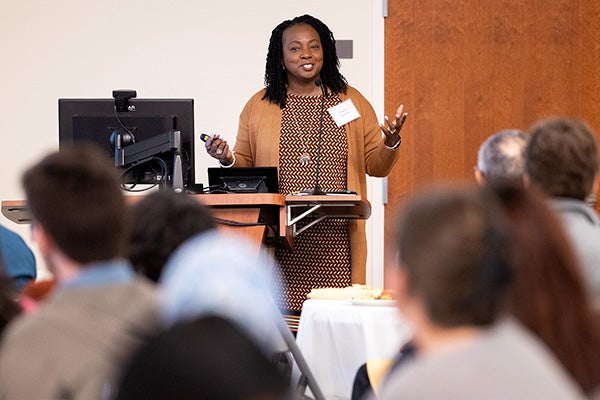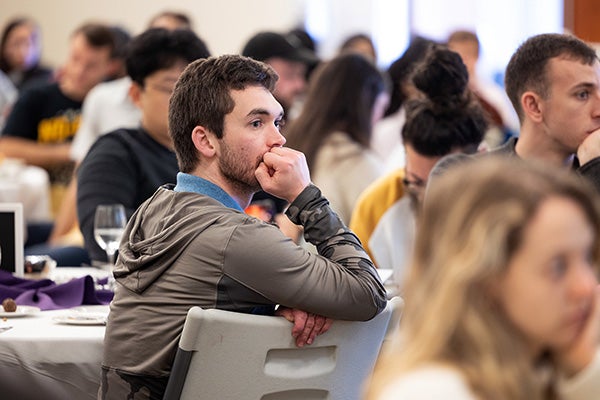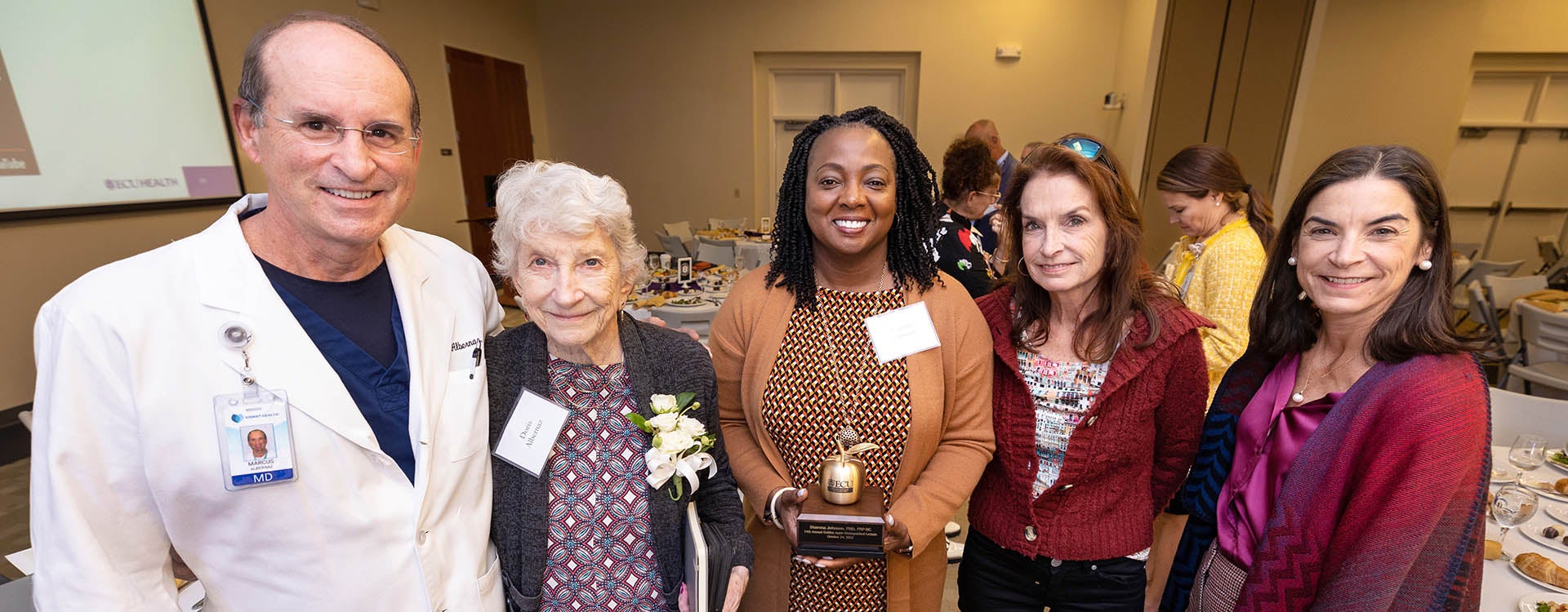Albernaz Lecture speakers encourage medical students to embrace storytelling
The noon-time crowd that filed into the East Carolina Heart Institute Oct. 24 was fairly typical, headed to a catered luncheon to listen to a speaker talk about something related to health care. Students from East Carolina University’s Brody School of Medicine, and other invited guests, passed through a banquet hall full of tables already placed with meals and glasses full of iced tea.
The contents of each of the seats that greeted the guests, however, was decidedly not typical — pale grey notebooks emblazoned with the ECU Health logo — a gift from Brody, so that students might begin to record their own stories about their medical training and the path to becoming doctors.

Dr. Sharona Johnson, the nursing Advanced Clinical Practice administrator for ECU Health, speaks to first-year medical students during the 16th annual José G. Albernaz Golden Apple Distinguished Lecture at the East Carolina Heart Institute on Oct. 24. (Photos by Rhett Butler)
In its 16th year, the José G. Albernaz Golden Apple Distinguished Lecture brought together speakers to discuss how understanding patient stories, as well as their own narratives, could help Brody’s first-year medical students learn to be better medical providers.
The lecture is named after Dr. José G. Albernaz, who was born in Brazil and became one of the first fully trained neurosurgeons to practice in his home country. In 2006, the Albernaz family established the annual lecture with the goal of providing support for visiting physicians to share their expertise with ECU medical students and the local medical community.
This year’s keynote speaker was Dr. Sharona Johnson, a family nurse practitioner, who is the nursing Advanced Clinical Practice administrator for ECU Health.
Dr. Michael Waldrum, ECU Health CEO and dean of the Brody School of Medicine, introduced Johnson and gave the students some advice of his own.
For Waldrum, telling stories was integral to the beginning of his education. Most college freshmen who declare medical school as their intention don’t get a bachelor’s degree in English. Waldrum credits narrative as being key to understanding how to understand the whole person.
“It’s hard to learn the technical aspect of becoming a provider and a physician. It’s a lot of hard work, and it’s scary,” Waldrum said. “I was a pre-med English major because I wanted to learn about people; I wanted to understand people. Studying humanities is essentially studying about the human reaction, interaction and how people get along.”
Waldrum challenged the first-year students to learn the technical aspects of medicine, but to also remember stories, those of their classmates and remember that the end of medical school is the start of a new chapter in an open book.
Johnson, a storyteller in her own right with a book published in 2021, challenged the medical students to remember when they last felt truly seen, which is what patients really want from their medical provider.

First-year medical students listen to speakers during the 16th annual José G. Albernaz Golden Apple Distinguished Lecture at the East Carolina Heart Institute.
“When were you really listened to? How did you know? What did that feel like?” Johnson asked. “Today we want just the facts. We’re in a hurry. We have technology. We have emergencies, we run back and forth, and we don’t have time to listen. It’s all about the data and the data points and how they all come together. Well, you know what? Data doesn’t interpret itself. There has to be a story in there.”
Johnson told an emotional story about living in Fairbanks, Alaska, and being the charge nurse when a man was rushed into the hospital with a heart attack. She and her staff were ready, with every conceivable skill and device, to treat the man’s ultimately untreatable condition. Her team had done everything right. The man’s wife entered the room and slipped his chill hand from under a sheet. She watched, helplessly, as the new widow began to come to terms with how her own life’s story had radically shifted.
“She said, ‘I was waiting for you to get home.’ She said, ‘You promised we would go for a walk today,’” Johnson recalled. “Finally, when the physician met with her in the room, she said, ‘We’ve been married for years.’ She said, ‘We adopted three children out of a dysfunctional home. We are all they have. We wanted to give them a better life.’”
“We did everything we could for him,” Johnson continued. “We really did. But we didn’t know his story. Would we have done something differently? I’ve seen many patients who had (heart attacks) and coded, but they all had names and they all have a story. I’ve never encountered a person without a story again.”
Johnson urged the audience to remember that some stories are still being written, that the pen is still on the page. By funding the lecture series, the Albernaz family is continuing to tell Dr. José Albernaz’ story nearly 100 years after his birth, and encouraging the next generation of doctors to be fully rounded physicians and people.
Yaqot Nasser, a first-year medical student from Lumberton, maintained a journal before starting medical school, and said that the speakers at the lecture motivated her to continue the practice. While the first-year medical students haven’t begun seeing patients yet, Nasser believes that the process will help through the successes and challenges that lie ahead.
“It was really cool to see this idea is backed by research and that it’s actually like therapeutic and helpful for students,” Nasser said, talking about her experience with journaling during the early days of medical training. “It’s not patient stories, but a reflection of what I’ve been experiencing and how I’ve been learning. I’m learning a lot about myself throughout this journey.”

Members of Dr. José G. Albernaz’ family pose with Dr. Sharona Johnson following her remarks.